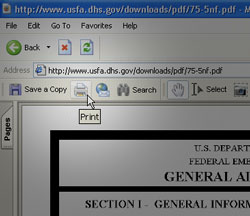Download Plug-Ins
The file formats below are found on the USFA Website. We are providing the following links to these plug-ins so our viewers may access information using these products stored on our website. USFA does not endorse any non-government Websites, companies or applications.
If you have difficulty with a format that is not discussed here, please Contact Us.
Portable Document Format (*.pdf)
HTML (the code behind Web pages) cannot maintain all the original formatting and presentation of many documents. In such cases, we use a different format: Adobe Portable Document Format (PDF). PDF documents maintain the look of the original document, and they can be viewed on any Macintosh, PC, or Unix computer. First, however, you must download and install the free Adobe Reader program. Please use the most current reader from Adobe to ensure compatibility with all PDF files on USFA's site. The Adobe Reader is also sometimes referred to as the Adobe Acrobat Reader.
Installing Adobe Reader
The Adobe Reader Website contains detailed information on this product, and allows you to download free copies of Adobe Reader for Windows, Macintosh, or UNIX systems.
We suggest that you configure Adobe Reader as a plug-in application for your Web browser. You won't have to wait for a separate application to launch; you can read PDFs directly in your browser. You can start reading the PDF file while it's still downloading. You can also read PDF pages side by side.
If you already have a Web browser installed on your computer when you install Adobe Reader, it should automatically install itself as a browser plug-in. You will know that it is properly installed as a helper application if you see the PDF file in the browser window, with a row of special Reader buttons along the top of the viewing screen.
Printing Adobe PDF Files
When printing Adobe PDF files from within your Web browser, DO NOT use the Web browser print facility. Instead, use the print button at the left end of the special Adobe Reader tool bar, which appears immediately above the viewing window. See illustration below for location of this print button.
Accessibility of Adobe PDF Files
Adobe provides online conversion tools to help visually disabled users read PDF documents. They convert PDF documents into either HTML or ASCII text, which can then be read by a number of common screen reader programs.
Visit the Accessibility Resource Center for more information on how to make .pdf files more accessible to people with disabilities.
Help with Other File Formats
Archive (*.zip)
Zip files are single files, sometimes called "archives," that contain one or more compressed files. Zip files make it easy to keep related files together. The Zip format is the most popular compression format used in the Windows environment. Files with this extension require a compression utility application, such as WinZip, to open and extract them. Mac OS X users should not require additional software to work with Zip files.
Audio Visual Interleave (*.avi)
This file format is supported by the Windows Media Player. Specific information may be found on the Microsoft Multimedia File Format Support Page.
Encapsulated PostScript (*.eps)
These files require an image manipulation or illustration program, such as Adobe Photoshop or Adobe Illustrator, to open them. Save the file to your computer and then open it using a software imaging program that supports this format.
Comma Separated Values (*.csv)
A comma-separated values file is used to store data structured in a table of lists form, where each associated item (member) in a group is in association with others also separated by the commas of its set. The CSV file format is very simple and supported by almost all spreadsheets and database management systems.
Excel (*.xls, *.xlsx)
Download the free Excel 2007 Viewer to open, view, and print Excel workbooks, even if you don't have Excel installed.
Moving Pictures Experts Group (*.mpeg)
This file format is supported by the Windows Media Player. Specific information may be found on the Microsoft Multimedia File Format Support Page.
PowerPoint (*.ppt)
Download the free PowerPoint Viewer to view full-featured presentations created in PowerPoint 97 and later versions.
Apple QuickTime (*.qt, *.mov)
Files with these extensions require the QuickTime player. You can download (free) and find guidance on how to install and use it from the QuickTime Website.
Real Media (*.ra, *.ram, *.rm)
Files with these extensions require the RealPlayer. You can download (free) and find guidance on how to install and use it from the RealPlayer Website.
Adobe Flash (*.swf)
Files with this extension require the Flash Player. You can download (free) and find guidance on how to install and use it from the Adobe Website.
Microsoft Windows Media (*.wmv, *.asx)
Files with these extensions require the Windows Media Player. You can download (free) and find guidance on how to install and use it from the Microsoft Website.
Word (*.doc)
Download the free Word 2003 Viewer to view, print and copy Word documents, even if you don't have Word installed.





